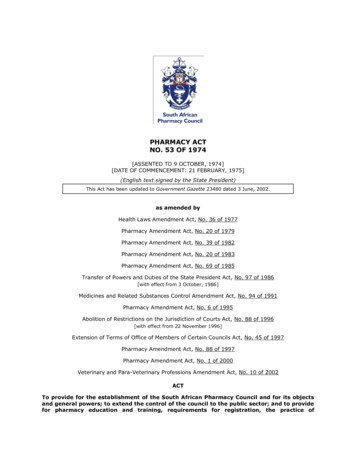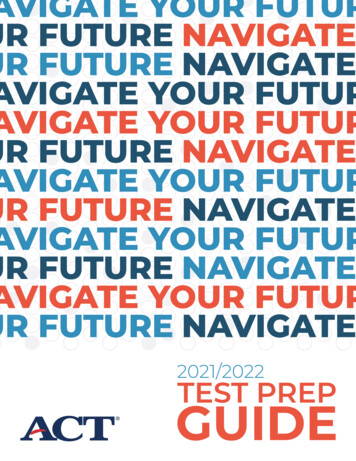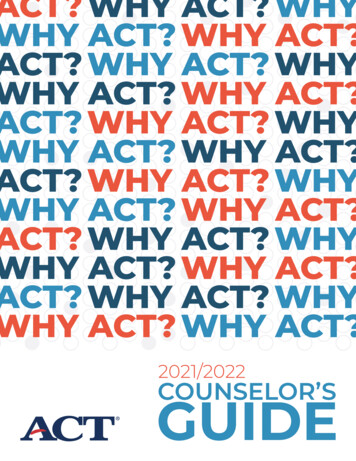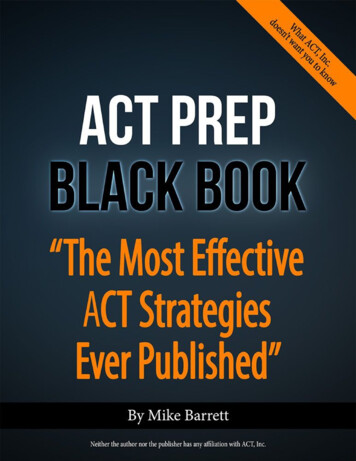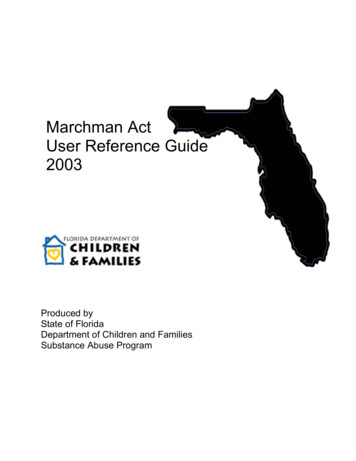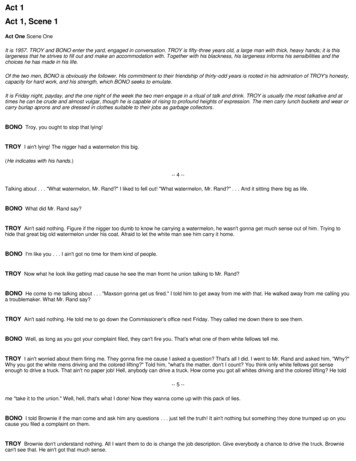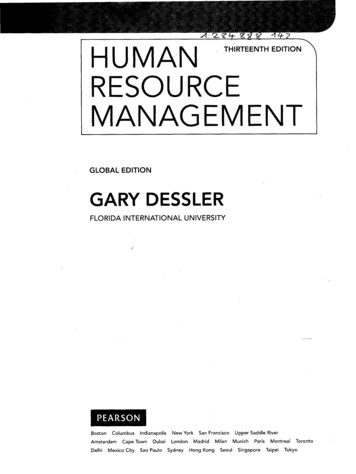
Transcription
HANDBOOK FORA ONE-ACT PLAYJunior High Contestsfor Directors, Adjudicators and Contest Managers2015-16 EditionHANDBOOKTHE UNIVERSITY INTERSCHOLASTIC LEAGUETHE UNIVERSITY INTERSCHOLASTIC LEAGUE
“I think I love and reverence all arts equally, only puttingmy own just above the others; because in it I recognizethe union and culmination of my own. To me it seems asif when God conceived the world, that was Poetry; Heformed it, and that was Sculpture; He colored it, and thatwas painting; He peopled it with living beings, and thatwas the grand, divine, eternal Drama.” Charlotte CushmanFor further information write:State Theatre DirectorUniversity Interscholastic League1701 Manor RoadAustin, Texas 78722512/471-9996 or 471-4517 (Office), 512/471-7388 (Fax)512/471-5883 (MAIN UIL SWITCHBOARD)E-MAIL: theatre@uiltexas.org
“In a well-planned One-Act Play Contest, there are no losers.”HandbookforA One-Act PlayJunior High ContestsAcknowledgementsA very sincere thanks to David Trussell, Connie McMillan and to Elisabeth Sikes for their contributions.I also wish to thank the Texas Theatre Adjudicators and Officials (TTAO) and the UIL Theatre AdvisoryCommittee for their work on this edition. The League also wishes to thank the Texas Educational Theatre Association, Inc. and the International Thespian Society for material contributions and continuedsupport of the One-Act Play Contest.
ContentsEducational Theatre .A Guide for Directors. 1The Contest Calendar. .2The Contest Structure.2Student Company Size .2Special Needs Accomodations.2The Directors.3Professional Acknowledgment Form.3Director Responsibilities.3The Contest.5Planning Meetings.5Levels. .5Advancing and Awards.5Time Limits.5Rules Violations.6Contest Administration.6The Contest Manager. .6Adjudicators. .7Contest Entry Procedures.7Substitutions and Additions.7The Contest Play.7Standards. .7Performing Plays on the Approved Lists.8Play Selection Policy. .9Performing Plays Not on the Approved Play Lists, Adaptations and Original Plays.9Licensing and Royalties. .9Performing a "Scenes From".10Adaptations. .10Drama Loan Library. 11Aid in Directing.12Finding or Hosting a Festival. .12Cast and Crew Assignments.13Rehearsals.13School Performances.14Extracurricular Defined.15The Contest Site . .16Music Playback and Intercommunications Equipment.16Lighting at the Contest Site.16The Unit Set. .17Actors on Elevated Unit Set Elements. .18Standard Door and Window Units.18Scenic Elements and Properties.19Lighting and Projectors.19Softgoods.20Capitals and Bases.20Trees, Bushes, Plants and other Landscaping.21Fence and Railing.21Stage Properties. .21Special Issues Regarding Properties. .24
Properties With Casters. .24Tobacco/ Alcohol.24Live Animals.24Unit Set Used as Properties.24Scenic Items and Properties Requiring Approval.27Fog, Snow, Water, Fire and Other Special Effects.28Firearms and Other Weapons.28Music and Sound Issues.29At the Contest. .30Conduct.30No Later Than 10 Days Prior To the Contest.30The Rehearsal.31The Directors Meeting.31The Performance. .32The Decision.34The Critique.34Evaluating Your Adjudicator and Contest Manager.35Glossary.36Bibliography.39Guide for Adjudicators.41Function & Qualifications.43Ethical Considerations.43Pre-Contest Procedures.43Contest Procedures.44Working Conditions. .45Judging the Play. .45Selection of the Acting Awards.45Oral Critique Instructions.46Evaluation Form Instructions and Links to Judging Materials.48Evaluation Form.49Glossary of Terms for Form. .52Panel Judging Procedures.53Guide for Contest Managers.55UTEID and Online Certification.56Function.57Procedures: Planning Meeting (Zone and District).58Planning Meeting Sample Agenda.59To-Do List: Post Planning Meeting.62Sample Info Letter.63Things to Learn While You Wait Until February.66To-Do List: 30 Days Prior to Contest.67To-Do List: 10 Days Prior to the Contest.68Site Crew Job Descriptions. .69Timekeepers Instructions.70What Should I Look For When I Get Contestant Entry Form.71To-Do List: 3 Days Prior to Rehearsals.72The Contest Site - Lighting.73Sound, Storage and Dressing Rooms at the Contest Site.74Rules Regarding Official Rehearsals.74Procedures: Official Rehearsals.75
To-Do List: Contest Day.77Procedures: Before the Contest.78To-Do List: When They Arrive.78Model Directors Meeting Agenda. .80Rules Related to Set and Strike.81Procedures: Starting the Contest and Performances. .82Stopping a Performance.82Rules Related to Announcements and the 60-Second Rule.83Rules Related to Performance.83Rules Regarding Violations. .84Procedures: Violations.85Procedures: Conclusion of the Contest.86Procedures: Awards Ceremony and Critique.87Procedures: After the Contest.87Procedures: Panel Judging.88TTAO Tabulation Tool. .89
Educational TheatreA DefinitionModern educational theatre is a creative, practical activity. Its participants learnto do by doing those scores of tasks which are required of them as they aretaught the art of play production. They learn to think independently becausethe development of individual thought and action is one of the basic elements ofplay production. They learn to appreciate the dignity of human labor becausethe theatre demands a great amount of human labor. They learn to master thetechniques of handling tools, needles, pigment, electrical equipment, paint,lumber, and cloth. They learn to sell tickets and advertising, to make andupholster furniture, and to launder clothing. They draw upon their knowledgeof mathematics, physics, speech, art, journalism, music, English, dance, history,literature, industrial arts, psychology, homemaking, and foreign languages, andcombine all these with specific training in the art of theatre as they work togetherto produce a single play.Modern educational theatre is a creative, culturally enlightening activity. Its participants learn to appreciate thegreat literary masterpieces of Moliére, Shakespeare, O’Neill, Shaw, and the Greeks, because the works of thesemasters must be thoroughly studied and understood if they are to be brought to life on the stage. An appetite forgood literature is created, and motivation for literary appreciation is strongly established by the requisites of playproduction.Modern educational theatre is a creative democratic activity. Students learn the principles of democracy and civicresponsibility because these principles are inherent in an effective educational theatre program. Working togetherin close harmony as members of a play company, establishing the esprit de corps which occurs so naturally duringrehearsal periods, assuming responsibilities as crew members, coordinating all work projects to meet a deadline,settling with tolerance and understanding the differences of opinion and procedure which are always present in afree society, learning to command and be commanded: these are aspects of functional democracy and communityleadership which are encountered daily by all who work in play production. Such an activity makes a definitecontribution to the improvement of democratic process in the community.Modern educational theatre is a creative activity which has personal and therapeutic values. Students developsuch qualities as self-confidence, poise, cooperativeness, initiative, resourcefulness, self-control, self-discipline,and a sense of understanding and appreciation of the abilities and efforts of others. They learn the importanceof systematic organization, orderly procedure, and detailed planning because even the most casual type of playproduction encourages and requires the development of organizational abilities. Students in educational theatreexperience the feeling of belonging; they are provided with a controlled outlet for physical, emotional, and mentaldisturbances which seem common to most young people. They discover through dramatics a more definite purposefor staying in school and an acceptable reason for giving closer attention to the other scholastic pursuits. If studentsare shy, they are taught to overcome shyness. If they are too aggressive, they learn to temper aggressiveness withconsideration for others. In play production students find an opportunity to expend excess energy in a constructiveand educationally productive way, to develop imagination, and to use leisure hours to better advantage.Modern educational theatre is a creative activity which has definite vocational possibilities. One of the reasons forthe increased number of collegiate theatre courses has been the demand for public school and university teachersof theatre arts. Educational theatre also exists for the purposes of giving training to those students who seek careersin television, community and professional theatre, dance, and the motion picture industry.Therefore, educational theatre is a creative segment of academic life which becomes more than an extracurricularactivity, more than a medium of entertainment, and more than just a class play. It provides actual experience inpracticing democratic principles of living which increases the student’s potential values to the community. It suppliespersonal and therapeutic values which give a greater emotional and mental stability and which enhance the chanceto provide an adequate livelihood. Students can find somewhere in the diversified intricacies of play production anopportunity to use all of their talents and capabilities. Each of their needs is met in the educational theatre becauseof the scope and comprehensiveness of its activities.F. Loren Winship served as League OAP Director beginning in 1938. He is considered by many to be the fatherof modern educational theatre.
A One-Act Play Contest CalendarDates Subject to Change – Always Check the Current Constitution & Contest Rules (C&CR) and theA HandbookEarly SeptHold district organizational meeting for Fall/Winter (Dec. 1 - Jan.31)district OAP meets.Before Nov 16Hold district Planning Meeting for Spring (Feb. 1 - May 28) districtOAP meets10 Calendar DaysPrior to YourFIRST ContestDeadline for Contestant Entry, play and set information and additionaldirectors to be entered via the A OAP Fall/ Winter Online ContestantEntry Form without DEC approval. (System opens 10/1.)Dec 1First day Fall/Winter A OAP Contests may be scheduledJan 31Last day Fall/Winter A OAP Contests may be scheduled.10 Calendar DaysPrior to YourFIRST ContestDeadline for Contestant Entry, play and set information and additionaldirectors to be entered via the A OAP Spring Online Contestant EntryForm without DEC approval. (System opens 12/1.)Feb 1First day Spring A OAP Contests may be scheduled.May 31Last day Spring A OAP Contests may be scheduled.45 Calendar DaysPrior to YourFIRST ContestDeadline to Submit Plays Not On the Approved Lists and Set Additions.IF YOU MISS A DEADLINERequired items submitted after the deadline require a majority consent of the appropriate executivecommittee or the meet director, if authorized, in order to be accepted. A letter, signed by the school’sadministrator, certifying the fact that the appropriate executive committee or the meet director hasapproved the late entry shall be submitted to the Contest Manager.
1Handbook for One-Act PlayA GUIDEFORDIRECTORSUIL-Drama, PO BOX 8028, Austin, Tx 78713 - 512/471-9996, 512/471-7388 (Fax)
2Handbook for One-Act PlayThe Contest StructureParticipation Each member junior high school may enter a single play.If less than three schools are enrolled to compete in the district in which a school participates a school may enter two plays. (Contact the State Office by the deadline, or junior high schools may combine with junior high schools from different conferences and districts to form a OAP district. Any points awarded go backto the participating school’s home district and count toward the home district’soverall championship point totals.Eligibility Students in the seventh and eighth grades who are eligible under Section 1400 mayenter this contest.Sixth graders who are eligible under Section 1400 may participate in the contest if theyattend school on the same campus as the seventh and eighth grade.Participants shall be fulltime students in grades six, seven or eight at the school theyrepresent.There is no amateur rule for this contest. Students may work as paid professionals intheatre or film, summer stock, television commercials, etc. and still participate in OAP.Student Company SizeThe Company may include a maximum of 24 students and may include the following maximumallotment:1. a maximum of 15 cast members,2. a maximum of 5 crew members and3. a maximum of 4 alternates.Special Needs Accommodations or ModificationsUIL Staff members will consider accommodations or modifications for students with specialneeds on an individual basis.The specific requests must be submitted to the League office in writing or on school letterheadby the director or administrator at least two weeks prior to the contest.The conditions of the adaptations or modifications must adhere to the following criteria:a) the student must be able to compete at the same time as the other contestants;b) the student who is given special consideration does not gain an advantage overother contestants; andc) the student who is given the special consideration does not cause the other contestants to work at a disadvantage.Only one response letter is needed from UIL for the adaptation to be granted at any level ofcompetition. It is the responsibility of the school to notify the Contest Managers ahead of time.The school district is responsible for providing equipment and interpreters where needed.Web: www.uiltexas.org Email: theatre@uiltexas.org
Handbook for One-Act PlayThe DirectorsDefinitions and Exceptions regarding DirectorsDirectors for eighth grade and below do not have to be full-time employees of the school district.Up to three people may be listed as directors on the Contestant Entry Form.Student teachers may volunteer to assist in directing the one-act play during the semesterthey are assigned to a participant school while fullfilling their student teaching requirements.They may be listed as directors on the eligibility notice and program. Schools shall not paystudent teachers for assisting.NOTE: FIRST-YEAR TEACHERS AND DIRECTORSProfessional Acknowledgment FormThe UIL requires that all One-Act Play directors sign the Professional Acknowledgment Format the beginning of their tenure in that position. The Professional Acknowledgement form indicates the director has read and agrees to abide by the rules. Your principal or superintendentis responsible for keeping it on file.A copy of the "Professional Acknowledgment Form" may be downloaded from the Theatrepage on the UIL website.Directors' Responsibilities and The Ethics CodeResponsibilities:1. Maintain a safe environment.2. Accept, embrace and teach this literal truth, “In a well-planned OAP contest, there areno losers.”3. Select a high-quality play that highlights the quality of educational theatre in your schooland best uses your and your students’ talents.4. Help your company achieve their highest potential by conducting your production in thehighest quality manner.5. Familiarize yourself with matters and issues regarding contest rules, contest management, and contest adjudication.One-Act Play Contest Ethics Code:One mission of the UIL One-Act Play Contest is to promote a spirit of cooperation amongall involved directors, students, administrators, parents and audience members topromote growth in the realm of educational theatre. The One-Act Play Contest EthicsCode shall carry the force of rule. Member school districts, participant schools and/orcovered school district personnel who violate any of the provisions of this code shallbe subject to penalty.(a) ONE-ACT PLAY CONTEST CODE. Section 901, the Spring Meet Code requires participants to:(1) Participate in the OAP contest with the spirit of fairness and sportsmanship, observing all rules both in letter and intent.UIL-Drama, PO BOX 8028, Austin, Tx 78713 - 512/471-9996, (Fax) 512/471-7388Guide ForDirectors - The Rules3
4Handbook for One-Act Play(2) Direct and sponsor companies and individuals without resorting to tactics whichattempt to skirt the rules or distract from sound educational principles.(3) Accept decisions of the adjudicator(s) and contest manager(s) graciously withoutquestioning their honesty or integrity unless concrete evidence of impropriety canbe brought forward. Extend courtesy to contest officials and site crews from thecompany members, school officials and audience. Conduct that berates, intimidates or threatens competitors, based on gender or ethnic origin, has no place ininterscholastic activities.(4) Receive the adjudicator’s point of view with an open mind. Negative reaction duringthe critique shall be deemed inappropriate.(5) Provide information or evidence regarding eligibility of any contestant or school tothe local school administration, then to the proper district executive committee. Towithhold information is considered dishonorable and contrary to good sportsmanship. Schools guilty of violating this section are subject to penalty.(b) CODE FOR ONE-ACT PLAY CONTEST DIRECTORS AND SCHOOL OFFICIALS. TheCode for one-act play directors and school officials includes the principles describedabove and the purposes listed in Section 1033 (a-d) and the “Guide For One-Act PlayContest directors” in the Handbook for One-Act Play. The Code requires:(1) Awareness, understanding and observance of all rules governing the competitionfor which the director is responsible.(2) Treatment of company members based on sound educational precepts and thegeneral welfare and health of the student.(3) Professional courtesy to other directors, contest manager(s), adjudicator(s) andparticipants.(A) Directors shall comm
Jan 31 Last day Fall/Winter A OAP Contests may be scheduled. Deadline for Contestant Entry, play and set information and additional directors to be entered via the A OAP Spring Online Contestant Entry Form without DEC approval. (System opens 12/1.) Feb 1 First day



